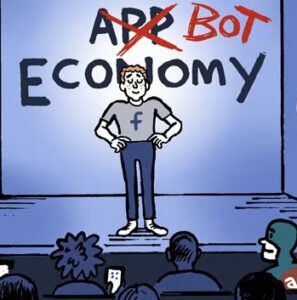The X Factor
Big-box department and clothing stores are getting hammered. So why is TJX, the parent company of discount chains TJ Maxx, Marshalls and HomeGoods, crushing it right now?
That’s a question recently mulled by Bloomberg writer Amanda Mull.
For one, TJX has a few fortuitous tailwinds. Manufacturers over-acquired raw goods earlier this year to stock up for tariff-related price increases. That’s ideal for TJX, which buys products cheaply when other companies overproduce.
But, also, TJX is not a retail media player whatsoever and cares way more about in-store sales than it does about ecommerce. In-person is simply a more exciting shopping experience, CEO Ernie Herrman told investors during the company’s quarterly earnings call last week.
And that, he said, is something the competition lacks, excitement. Consumers are therefore “very open to trying us,” Herrman said.
Other retailers have reshaped their store footprint around ecommerce warehousing and buy-online, pick-up-in-store fulfillment. Stores, in turn, become less appealing, sometimes as a direct result of retail media.
Who remembers the Walgreens-Cooler-Screens fiasco?
Don’t Crawl On Me
Two roads diverged in a yellow wood: One leads to a partnership with OpenAI, the other to blocking OpenAI’s bots.
In contrast to Walmart’s headfirst dive into agentic shopping, Amazon recently updated its robots.txt file to block more OpenAI bots from crawling its site, Modern Retail reports.
ChatGPT has been providing more referral traffic for some retailers, like Walmart and Target, but Amazon prefers shoppers to purchase from it directly, rather than via ChatGPT.
A primary incentive? Ads, of course.
Amazon’s advertising business generates roughly $56 billion a year, according to Modern Retail, and depends on shoppers browsing its site. (People can bypass ads when they’re shopping via ChatGPT.)
And so, for now, Amazon has been leaning into its own agentic shopping tools instead.
Still, Amazon hasn’t fully ruled out future partnerships with third-party agents. During the company’s most recent earnings call in late October, CEO Andy Jassy said he expects to “find ways to partner” with these companies in the future.
Bipartisan Haterade
You know you’ve messed up as a company when politicians are reaching across the aisle to try and figure out what your problem is.
Sens. Josh Hawley (R) and Richard Blumenthal (D) have asked the FTC and SEC to investigate Meta’s reportedly fraud-filled ad ecosystem, according to The Guardian.
In a joint letter, the senators cited recent reporting by Reuters that Meta is involved in one-third of all scams in the US and made $16 billion (or 10% of its overall revenue) from fraudulent and scam ads in 2024.
This isn’t the first time Hawley and Blumenthal have teamed up against Meta. In April, they announced an investigation into Meta’s alleged collaboration with the Chinese Communist Party to build censorship tools. And, last month, they introduced a bill to Congress that would require AI chatbot companies to enforce stricter age verification measures.
Basically, any time Meta makes headlines for something egregious, expect these guys to respond with world-class hater energy.
Speaking of which, a newly released legal brief suggests that, in 2019, Meta halted internal research when findings suggested that people who stop using Facebook report feeling less depressed. It should be fun to see what the senators make of that.
But Wait! There’s More!
Foreign content creators are making bank off America’s polarized political climate. [404 Media]
YouTube’s right-wing podcast stars have driven a surge in conservative-branded products fueled by host-read ads. [Bloomberg]
What the programmatic industry should expect in a changing Google ecosystem. [AdMonsters]
The European Union has unconditionally approved Omnicom’s acquisition of IPG. [Reuters]
Daily Mail owner DMGT bought its rival, The Telegraph, for $650 million. [CNN]
How tech broke the job market. [Business Insider]
You’re Hired
Ogury names WPP vet Nicolas Bidon as CEO. [release]
















